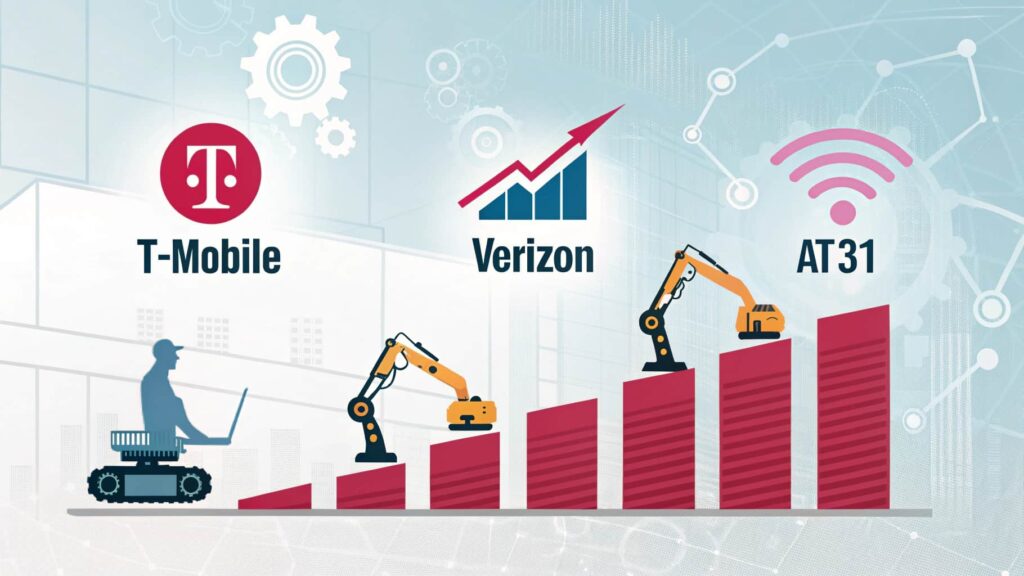T-Mobile layoffs refer to the company’s decision to cut around 5,000 jobs in 2023, mainly affecting corporate and back-office roles. The move was part of a cost-cutting strategy after slower growth and rising operational costs. Retail and customer service positions were not impacted.
Stay tuned with us for the latest updates on T-Mobile layoffs, workforce restructuring, and company developments.
What are the T-Mobile layoffs?
The T-Mobile layoffs refer to the recent job cuts announced by the company in 2023. Approximately 5,000 employees were laid off, accounting for around 7% of the workforce. Most of these jobs originated from corporate offices and back-end departments, rather than retail stores. T-Mobile stated that the reason behind the layoffs was to reduce costs and focus more on key business objectives.
These job cuts happened during a time when many tech and telecom companies were reducing staff due to market pressures and operational restructuring. The T-Mobile layoffs are part of a broader shift in the telecom industry, with more companies utilising automation, AI, and digital transformation to automate tasks once performed by people.
Why did T‑Mobile announce layoffs in 2023?

The T-Mobile layoffs occurred because the company faced rising costs to serve its customers. Many jobs overlapped after the Sprint merger. T‑Mobile needed to cut expenses and focus on fewer core goals. These changes help T‑Mobile stay profitable as automation and artificial intelligence take over routine tasks.
The T-Mobile layoffs enable the company to reduce overhead and invest in growth areas, such as 5G expansion and broadband services. Workforce optimization and cost reduction remain key drivers behind the decision.
How many employees were affected by the T‑Mobile layoffs?
About 5,000 employees lost their jobs in the T‑Mobile layoffs. That was nearly 7% of T-Mobile’s workforce at the time. Most of the job cuts were in corporate, back-office, and middle-management roles. Retail and customer service staff continued working without any job losses. The affected employees were offered severance packages and career transition support to ease the impact of the workforce reduction.
Which departments were impacted by the T‑Mobile layoffs?
The T‑Mobile layoffs primarily affected employees in corporate, back-office, and technology roles. These positions were deemed duplicative, misaligned with changing systems, or no longer aligned with the company’s current priorities.
Significantly, retail and consumer care teams, who directly serve customers, were not impacted by these cuts—the restructuring aimed to streamline operations and align with the company’s evolving digital strategy.
Will T-Mobile lay off more employees in the future?
T-Mobile does not anticipate additional widespread layoffs in the foreseeable future. CEO Mike Sievert stated that the company does not envision making further large-scale reductions across the organization after the current restructuring. The company has committed to offering employment opportunities to at least a majority of UScellular associates affected by the acquisition.
However, as with any large corporation, future organizational changes cannot be ruled out entirely. Employees should stay informed about company developments and maintain flexibility in their career planning, particularly in light of industry-wide trends of workforce realignment.
How do the T-Mobile layoffs relate to the Sprint merger?
The T-Mobile layoffs are closely linked to the company’s 2020 merger with Sprint. Executives initially promised that the merger would be a “jobs-positive” move, aiming to create thousands of new roles. However, the reality has been different. Since the merger, T-Mobile has reduced its workforce by approximately 9,000 employees, including 5,000 layoffs announced in 2023.
These cuts primarily affected corporate and back-office positions, with retail and customer service roles largely spared. The layoffs were attributed to the need to streamline operations and eliminate duplicate roles resulting from the merger. This contradicts earlier commitments to job creation, leading to criticism and concerns about the impact on employees.
Did T-Mobile offer severance packages to laid-off employees?
Yes, T-Mobile provided comprehensive severance packages to employees affected by the 2023 layoffs. These packages included:
- Severance payments based on tenure
- A minimum of 60 days of paid transition leave
- Accelerated vesting of stock options
- Continuation of tuition reimbursement benefits
- Career transition services
- A new T-Mobile alumni service discount, valid for life
CEO Mike Sievert emphasized that T-Mobile aimed to handle the layoffs with care and support, stating, “We have zero intention of being a faceless—or heartless—company in a situation that is already difficult.”
How do T-Mobile layoffs compare to other telecom layoffs?

In 2023, major U.S. telecom companies significantly reduced their workforces. T-Mobile laid off approximately 5,000 employees, or about 7% of its staff, primarily in corporate and back-office roles. Verizon and AT&T also made substantial cuts, with Verizon eliminating 11,700 positions and AT&T reducing its headcount by 12,450 employees. Collectively, these three companies accounted for over 27,000 job losses in 2023, reflecting a broader trend in the telecom industry toward workforce reductions.
Factors contributing to these layoffs include the adoption of automation technologies, such as artificial intelligence, and the need to streamline operations and reduce costs amid competitive pressures. These layoffs are part of a larger pattern observed across the telecom sector, with companies aiming to enhance efficiency and profitability through technological advancements and restructuring efforts. While these measures may improve operational performance, they also raise concerns about job security and the impact on employees within the industry.
Is T-Mobile still hiring despite the T‑Mobile layoffs?
Yes, T-Mobile is actively hiring across various departments. Despite the 2023 layoffs, the company continues to recruit for roles in retail, customer experience, business sales, technology, and corporate sectors. Positions are available both in-store and remotely, with opportunities for internships and early career programs. T-Mobile emphasizes its commitment to diversity, inclusion, and professional development, offering competitive benefits and career advancement resources.
For current job openings, you can visit the T-Mobile Careers Portal.
Are T-Mobile layoffs connected to AI or automation?
Yes, T-Mobile layoffs are connected to AI and automation. In August 2023, T-Mobile announced plans to lay off approximately 5,000 employees, or about 7% of its workforce, primarily in corporate, back-office, and specific technology roles. CEO Mike Sievert cited the need to “move at the speed of technology” and emphasized the use of artificial intelligence and other tools to meet customer needs and stay competitive.
The company has been integrating AI into its operations to enhance efficiency and reduce costs. For instance, T-Mobile has partnered with OpenAI to develop AI tools that aim to transform customer service. These tools are expected to reduce human support interactions by 75% by 2027, indicating a shift towards automation in customer service.
Additionally, T-Mobile has introduced AI-driven tools, such as “GenAI Chat” and “Promo Genius,” to assist employees in providing quicker and more accurate customer support. While these tools aim to improve service quality, they also reflect the company’s broader strategy to leverage AI for operational efficiency.
In summary, the T-Mobile layoffs are part of a strategic move to streamline operations and integrate AI and automation, aligning with industry trends towards digital transformation and innovative workforce management.
How will the UScellular acquisition affect T-Mobile employees?
The impending acquisition of UScellular by T-Mobile, announced in May 2024 for $4.4 billion, is set to impact both UScellular and T-Mobile employees significantly. While T-Mobile has committed to offering employment to a majority of UScellular associates, the integration process is likely to result in job restructuring, relocations, and potential layoffs.
Impact on UScellular Employees:
- Job Offers: T-Mobile has pledged to offer employment to a majority of UScellular employees, with compensation and benefits comparable to those currently in place. However, this commitment does not guarantee employment for all UScellular staff. Certain positions, especially those in overlapping roles, may be eliminated as part of the integration process.
- Layoffs: Approximately 4,100 UScellular employees are expected to be laid off as the acquisition progresses. These layoffs are scheduled to commence in early June 2025, in accordance with the Worker Adjustment and Retraining Notification (WARN) Act. Affected employees will receive severance packages and support for transitioning to new employment opportunities.
Impact on T-Mobile Employees:
- Operational Changes: T-Mobile employees may experience changes in their roles and responsibilities as the company integrates UScellular’s operations. This could involve consolidating departments, adjusting reporting structures, and adopting new technologies and processes.
- Cultural Integration: The merger will require efforts to blend the corporate cultures of T-Mobile and UScellular. Employees may undergo training and development programs to align with the unified company’s values and operational standards.
- Job Opportunities: The acquisition may create new job opportunities within T-Mobile, particularly in areas such as network expansion, customer service, and technology development. Employees may have the chance to apply for these positions, depending on their skills and career interests.
Considerations for All Employees:
- Adaptability: Employees are encouraged to remain adaptable and open to change as the integration process unfolds. Being proactive in acquiring new skills and staying informed about company developments can enhance job security.
- Communication: Maintaining open lines of communication with management and HR departments is crucial. Employees should seek clarification on any uncertainties they may have regarding their roles and the integration process.
- Support Resources: Both T-Mobile and UScellular are expected to provide resources to support employees during the transition. This may include career counselling, job placement assistance, and access to training programs.
In summary, while the UScellular acquisition presents opportunities for growth and expansion within T-Mobile, it also brings challenges that may affect employees. Staying informed, adaptable, and proactive will be key for all employees navigating this transition.
How has T-Mobile’s workforce changed since the Sprint merger?
Since the Sprint merger in April 2020, T-Mobile’s workforce has undergone significant changes. At the time of the merger, the combined employee count was approximately 80,000. However, by the end of 2022, T-Mobile reported having 71,000 employees, marking a reduction of about 9,000 jobs.
This decline in workforce numbers has been attributed to several factors:
- Restructuring and Integration: The merger led to the consolidation of overlapping roles and departments, resulting in job eliminations as the company streamlined operations to realise synergies from the integration.
- Technological Advancements: The adoption of automation and artificial intelligence in various functions, such as customer service and network operations, has reduced the need for specific manual roles.
- Operational Efficiencies: T-Mobile focused on enhancing efficiency and reducing costs, which included workforce reductions in corporate and back-office functions.
Despite these reductions, T-Mobile has maintained that it has upheld its commitment to job creation by creating new roles and expanding its business in areas like 5G deployment and broadband services. The company continues to recruit for positions in various departments, including retail, customer service, and technology.
In summary, while T-Mobile’s workforce has decreased since the Sprint merger, the company has taken steps to adapt to the evolving telecommunications landscape, striking a balance between job reductions and new opportunities in emerging areas.
Did T-Mobile’s stock price react to the layoffs?
Yes, T-Mobile’s stock price has shown sensitivity to announcements of layoffs, reflecting investor concerns about cost-cutting measures and their implications on the company’s long-term performance.
Recent Stock Performance:
Post-First Quarter 2025 Earnings: Despite reporting earnings per share (EPS) of $2.58 and revenue of $20.89 billion—both surpassing analyst expectations—T-Mobile’s stock fell by more than 5% in premarket trading. This decline was attributed to the company adding fewer postpaid phone customers than anticipated, signalling potential challenges in subscriber growth.
Stock Price Movement:
As of June 12, 2025, T-Mobile’s stock (NASDAQ: TMUS) is trading at $230.94, reflecting a decrease of 2.5% from the previous close.
Market Perception:
While layoffs are often viewed as a strategy to reduce operational costs, they can also raise concerns about the company’s ability to maintain growth and innovation. Investors may interpret significant workforce reductions as a sign of underlying business challenges, affecting stock valuations.
Long-Term Outlook:
T-Mobile’s emphasis on technological innovation, including AI integration and 5G expansion, aims to strengthen its competitive position. The company’s ability to effectively balance cost management with growth initiatives will continue to influence investor confidence and stock performance.
What should T-Mobile employees do if they are affected by layoffs?
If you are affected by the T-Mobile layoffs, consider the following steps:

- Review Severance and Benefits: Understand your severance package, continuation of health insurance, and any outplacement services offered by T-Mobile.
- Update Your Resume: Highlight your skills and accomplishments relevant to the telecom, technology, and customer service sectors.
- Network: Connect with former colleagues and industry contacts. Join professional groups and platforms, such as LinkedIn, to explore new job opportunities.
- Consider Reskilling: Explore training programs, particularly those related to AI, automation, and emerging telecom technologies, to enhance your employability.
- Seek Support: Utilise career counselling and mental health resources to help manage the transition period.
How can T-Mobile employees prepare for future industry changes?
The telecommunications industry is rapidly evolving, driven by technological innovation and shifting consumer demands. To prepare for future changes, T-Mobile employees should:
- Embrace Continuous Learning: Stay updated with the latest telecom technologies, including 5G, AI, machine learning, and automation tools.
- Develop Soft Skills: Communication, problem-solving, and adaptability remain crucial as companies undergo digital transformation.
- Be Open to Mobility: Consider roles across different departments or geographic locations within T-Mobile or the broader telecom sector.
- Engage in Professional Development: Participate in workshops, certifications, and internal training offered by T-Mobile.
- Stay Informed: Monitor industry trends and company news to anticipate shifts that may impact your role.
FAQs
Q1: Are the T-Mobile layoffs permanent?
Yes, the layoffs announced in 2023 and those related to the UScellular acquisition are permanent job eliminations.
Q2: Will T-Mobile rehire laid-off employees later?
While there is no formal rehiring program, laid-off employees may reapply for future openings as the company grows or new roles become available.
Q3: How is AI changing jobs at T-Mobile?
AI is automating routine tasks, especially in customer service, which reduces some roles but creates opportunities for employees to work with new technologies.
Q4: Does T-Mobile offer career transition support?
Yes, severance packages include career transition services like resume help and job placement assistance.
Q5: How does the UScellular acquisition affect current employees?
It may lead to job restructuring and layoffs but also offers potential new opportunities within the expanded company.
Q6: Are retail jobs safe from layoffs?
Historically, retail and customer service roles have been less affected in recent layoffs.
Q7: How does automation impact job security at T-Mobile?
Automation may reduce some roles but also creates demand for employees skilled in managing and developing AI systems.
Q8: Why are people leaving T-Mobile?
Employees have concerns about job security due to recent layoffs and restructuring. Also, a shift towards digital services and automation is reducing in-store interactions, which impacts some retail staff.
Q9: What is T-Mobile’s severance package?
It includes:
- Lump sum severance: 8 weeks of salary plus 2 weeks per year of service (max 26 weeks)
- Minimum 60 days paid transition leave
- Accelerated vesting of stock options
- Prorated bonus
- Outplacement services depend on the employment level
Q10: What is going on with T-Mobile today?
As of June 12, 2025, T-Mobile’s stock has been declining for three consecutive days. CEO Mike Sievert is reportedly planning to step down before his contract ends
Q11: Does T-Mobile really pay $20 an hour?
A11: Yes, T-Mobile has set a nationwide minimum wage of $20 per hour for all hourly employees. However, some retail employees might not see a raise if their total pay including commissions already meets or exceeds $20/hr.
Conclusion
The T-Mobile layoffs reflect the tough choices companies must make in a shifting tech and telecom world. While thousands of employees have been affected, T-Mobile says it’s focused on long-term growth, streamlining operations, and staying competitive. As the industry evolves with automation and mergers, keeping an eye on how these changes unfold is key for workers, investors, and customers alike.
Also read:
- What Is a Mobile Notary? Benefits and How It Works!
- The Sensation Mobile Home: Affordable & Modern Living!
